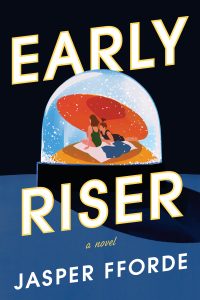Gabino Iglesias Reviews The Fervor by Alma Katsu
 The Fervor, Alma Katsu (G.P. Putnam’s Sons 978-0-59332-833-0, $27.00, 320pp, hc) April 2022.
The Fervor, Alma Katsu (G.P. Putnam’s Sons 978-0-59332-833-0, $27.00, 320pp, hc) April 2022.
Fantasy, spy thrillers, horror; Alma Katsu can do it all. A quick glance at her oeuvre, which includes titles like Red Widow, a 2021 spy thriller that changed the game by focusing on women; the Taker Trilogy, which brings together the supernatural with elements of fantasy, romance, and suspense; and The Hunger, a truly outstanding historical fiction horror novel that spins the story of the Donner Party into a horror tale with a creepy supernatural twist, proves that she is a master storyteller, regardless of genre. However, between The Hunger, The Deep, and now The Fervor, Katsu’s latest novel, mixing historical fiction with horror seems to be the thing she can do like no one else can.
The Fervor takes place in the early 1940s as WWII rages. In the United States, Japanese citizens have been thrown into internment camps and anti-Japanese sentiment grows across the country. In Idaho, Meiko Briggs and her daughter, Aiko, are stuck in one of these camps, Minidoka, while Mr. Briggs is off fighting in the war. Meiko and Aiko struggle to keep things going in a relatively normal fashion while constantly dreaming of the day they are allowed to return home to Seattle. Unfortunately for them, things aren’t looking good. There is a disease – something that starts out like a bad cold – spreading around at the camp. The disease causes people to become incredibly violent, and soon there are reports not only of attacks but also of horrible deaths. When government doctors get to the camp, things get worse, and when Meiko contracts the disease, she and Aiko are separated. Aiko is told her mother is dead, but that’s a lie. In the chaos that follows as the situation both in and out of the camps worsens, Aiko sets out to find both her mother and a familiar space while Meiko is locked away in the middle of nowhere and forced to endure daily mistreatment at the hands of army personnel who seem obsessed with her blood. Meanwhile, a reporter named Fran is making her way across the country, pursuing a bizarre story about strange balloons covered in a bizarre substance and deadly explosions. Also, one of the victims was the wife of a young missionary, and he gets caught up in the wave of hatred sweeping the nation. Their stories will eventually come together, and they’ll team up to try to find out what’s really going on.
The Fervor is a superb novel that weaves together four separate narratives. Katsu carefully develops her characters in order to create not only complex personalities but also the kind of characters that feel real and almost immediately force readers to develop empathy. Horror fails without empathy, but it triumphs here.
There are several elements that deserve attention in this novel. The first is the way Katsu brings together historical fiction with Japanese folklore. While there are certain fragments that take place elsewhere, most of the Japanese characters we see are in the United States. However, their lives are full of yokai – apparitions and supernatural entities – and the jorogumo, a yokai that appears in the story as a spider demon. Also, the way Japanese culture can dictate behavior is a running theme through the story.
While there are apparitions, ghosts, and tiny spiders at work making The Fervor a creepy read, the biggest, most unrelenting horror in the narrative is racism. There are two kinds of books that deal with racism. The first are books that mention it in passing or that somehow want to show its pernicious effects in a roundabout way in order to steer clear of controversy or because the authors don’t want their work to be branded as political (which is hilarious, because every decision they make as writers is political). The second group of books tackles the subject head-on. The Fervor belongs very clearly to this second group. Katsu unapologetically brings to the page the awful racism Japanese people faced in the internment camps and the growing anti-Japanese sentiment that took over outside. A group called the Loyal Sons of the Republic is a perfect mirror of contemporary hate groups in the United States, and their words and actions show what happens when racism is allowed to fester unchecked. One of the leaflets says it all:
AMERICA IS BEING OVERRUN BY
YELLOW DEVILS!
DON’T LET THE JAPS STEAL
OUR COUNTRY.
AMERICA BELONGS TO WHITE PEOPLE.
Yes, The Fervor is an uncomfortable read because some of the worst horrors it contains belong to history and not fiction. However, this is exactly what makes it an absolute must-read. As a historical horror novel, this book is a triumph that thrills and entertains. It holds a dark secret at its core and has a memorable cast of broken characters fighting inner and outer demons in order to survive and get to the truth, but the constant presence of racism – a thing that echoes, sadly, a lot of the jingoistic, racist discourse found today – serves as a stark reminder that sometimes the horrors of the supernatural pale in comparison to the awful things human beings can do to each other. But don’t fret, there is hope here, and the human spirit perseveres.
The Hunger, without a doubt one of my favorite horror novels of the last half decade, announced Katsu’s arrival as one of the leading voices of historical horror fiction. The Deep cemented Katsu as a genre fiction star. The Fervor takes things one step further and makes Katsu the queen of historical horror.
Gabino Iglesias is a writer, journalist, professor, and book reviewer living in Austin TX. He is the author of Zero Saints and Coyote Songs and the editor of Both Sides. His work has been nominated to the Bram Stoker and Locus Awards and won the Wonderland Book Award for Best Novel in 2019. His short stories have appeared in a plethora of anthologies and his non-fiction has appeared in the New York Times, the Los Angeles Times, and CrimeReads. His work has been published in five languages, optioned for film, and praised by authors as diverse as Roxane Gay, David Joy, Jerry Stahl, and Meg Gardiner. His reviews appear regularly in places like NPR, Publishers Weekly, the San Francisco Chronicle, Criminal Element, Mystery Tribune, Vol. 1 Brooklyn, the Los Angeles Review of Books, and other print and online venues. He’s been a juror for the Shirley Jackson Awards twice and has judged the PANK Big Book Contest, the Splatterpunk Awards, and the Newfound Prose Prize. He teaches creative writing at Southern New Hampshire University’s online MFA program. You can find him on Twitter at @Gabino_Iglesias.
This review and more like it in the May 2022 issue of Locus.
 While you are here, please take a moment to support Locus with a one-time or recurring donation. We rely on reader donations to keep the magazine and site going, and would like to keep the site paywall free, but WE NEED YOUR FINANCIAL SUPPORT to continue quality coverage of the science fiction and fantasy field.
While you are here, please take a moment to support Locus with a one-time or recurring donation. We rely on reader donations to keep the magazine and site going, and would like to keep the site paywall free, but WE NEED YOUR FINANCIAL SUPPORT to continue quality coverage of the science fiction and fantasy field.
©Locus Magazine. Copyrighted material may not be republished without permission of LSFF.





